Swiss criticise tougher US border checks
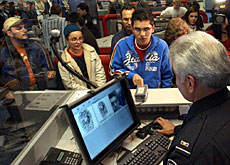
Swiss travellers to the United States can expect to be photographed and fingerprinted under a tightened border security programme.
The move, which has drawn criticism from Swiss politicians, affects millions of citizens in 27 countries who are allowed to travel in the US without visas for up to 90 days.
US officials said the change was prompted in part by concerns that terrorists might try to exploit the easier entry restrictions in place for some countries.
The changes in the US-VISIT programme will take effect from September 30.
Travellers will be fingerprinted and photographed each time they enter the United States through any of 115 international airports and 14 seaports.
Criminals
But the decision has been sharply criticised in some Swiss quarters.
“Visitors will be treated like criminals,” said Eugen David, a centre-right Christian Democrat parliamentarian.
David suggested on Swiss radio that US citizens should also be fingerprinted and photographed when they enter Switzerland.
Politicians from the centre-left Social Democrats and centre-right Radicals have also attacked the tighter entry restrictions.
Both parties have called on the justice minister, Christoph Blocher, to raise the issue with the European Union.
Data protection
Switzerland’s data protection commission is also concerned about the new measures and fears they could be misused.
“All the data collected electronically will have to go into a database, and there is no guarantee it will be safe,” said commission spokesman Kosmas Tsiraktsopulos.
“The vast majority of these people have never done anything wrong,” he added.
The commission admits, though, that biometric passports will be a much improved way of verifying a person’s identity.
“Border officials will be able to compare the data contained on the passport with the person in front of them, without referring to an outside source,” said Tsiraktsopulos.
Biometric passports
The Bush administration says it acted after deciding that most of the so-called “visa-waiver countries” would not meet an October deadline to have biometric passports in place.
These passports include fingerprint and iris identification features that make the documents virtually impossible to counterfeit. These features have yet to be introduced on US passports.
Citizens from visa-waiver countries are still excluded from the consulate interviews and background checks that people from other nations must submit to in order to obtain visas.
US officials claim the change will enhance security while ensuring that law-abiding visitors are not subjected to lengthy secondary screenings at the border.
The decision was also based on intelligence that terrorists would look to exploit the visa-waiver programme because it carries fewer security checks.
Travel restrictions
There are fears that travel could be affected by the new requirements. But the national carrier, Swiss, says it is not particularly concerned.
“We have seen passenger numbers to the United States drop off recently, but we can’t say if travel restrictions have played a role,” company spokesman Dominik Werner told swissinfo.
Fingerprinting and photographing visitors to the United States is not entirely new.
Swiss citizens applying for visas, which are needed for stays longer than three months, have been undergoing the procedure at the American embassy since the beginning of March.
swissinfo, Scott Capper
The new US entry requirements will go into effect on September 30.
They are valid for 115 airports and 14 ports.
Processing time for each visitor is estimated to be 23 seconds.
In 2001, 324,000 Swiss visited the United States, while only 254,000 travelled there in 2002.
Congress passed the US-VISIT program in response to the September 11 attacks.
In January, the American authorities began fingerprinting and photographing visitors from nations other than the visa-waiver countries.
About 2.6 million people have been processed so far and more than 200 with prior or suspected criminal or immigration violations have been stopped.
The estimated 13 million annual visitors from visa-waiver countries is not expected to create massive backlogs at airports and seaports.
The countries concerned by this decision include Britain, Japan and Australia, while Canadians will not have to go through the procedure.
The existing system should handle the additional checks and new inspectors or computers will not be needed according to the Americans.

In compliance with the JTI standards
More: SWI swissinfo.ch certified by the Journalism Trust Initiative
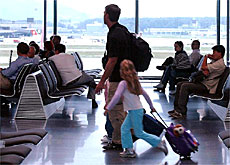
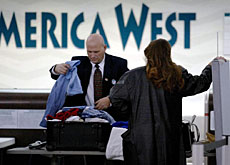
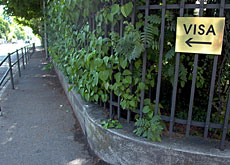
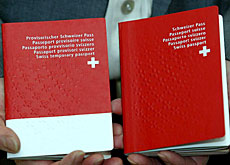
You can find an overview of ongoing debates with our journalists here. Please join us!
If you want to start a conversation about a topic raised in this article or want to report factual errors, email us at english@swissinfo.ch.